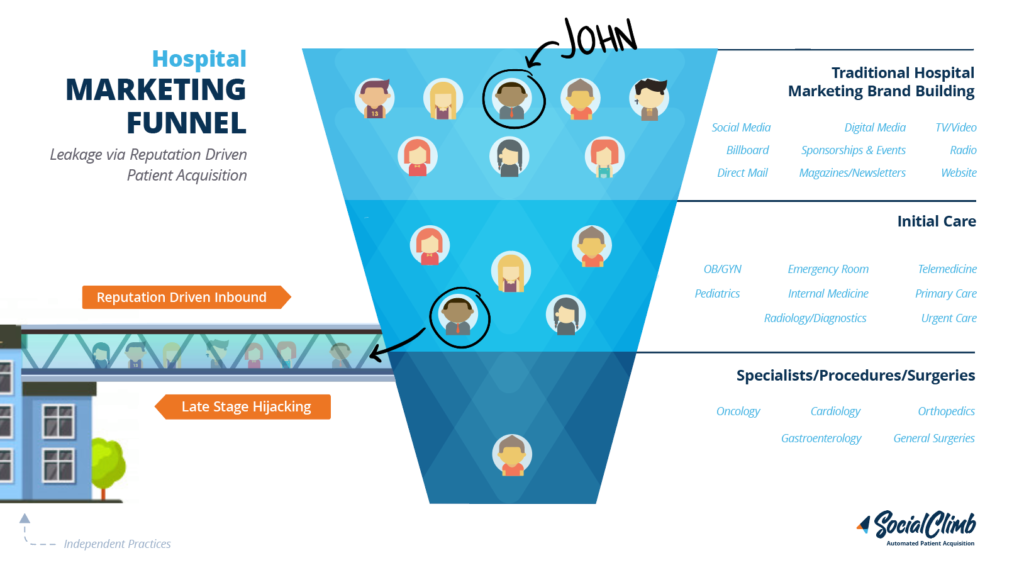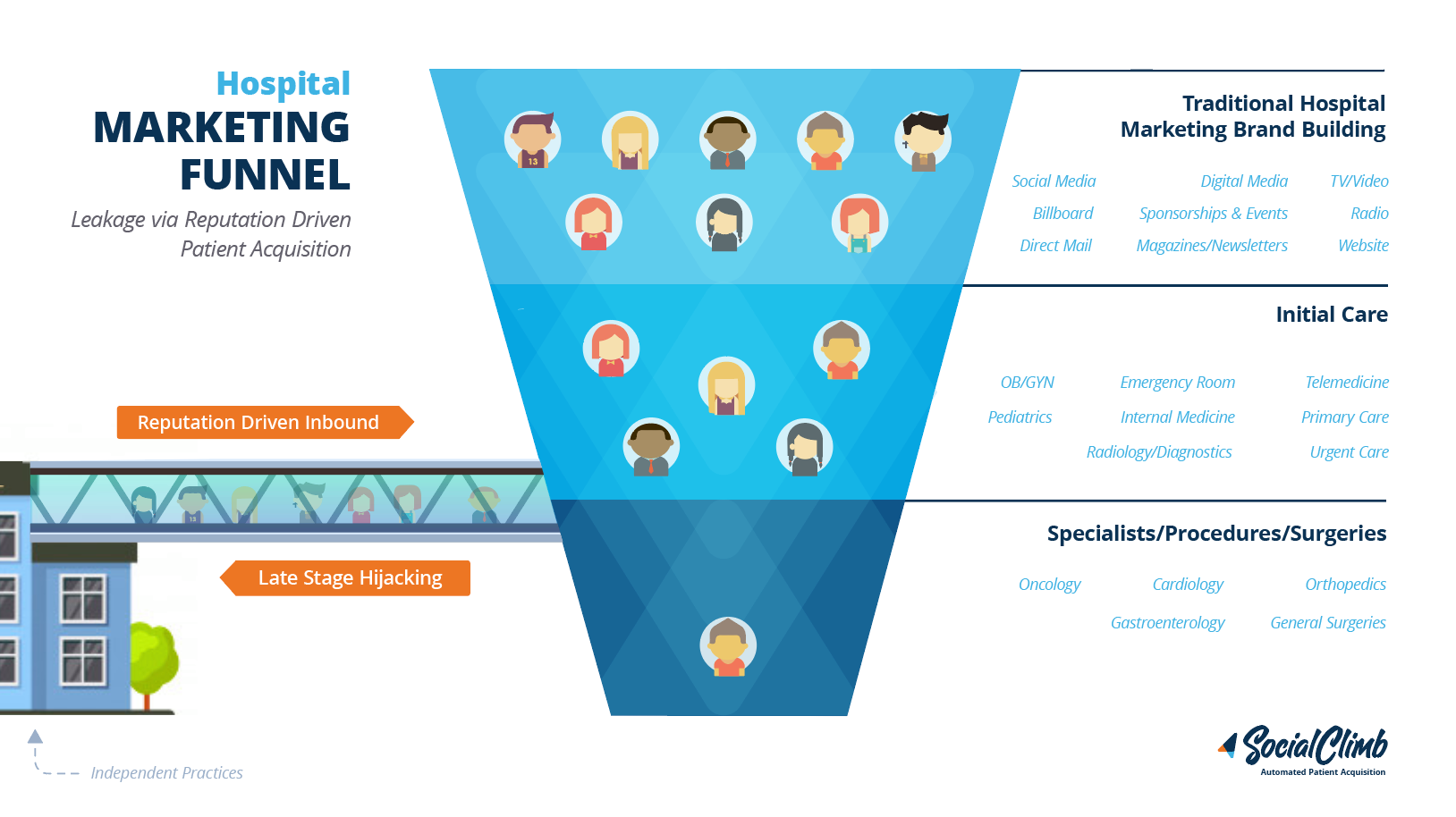Hospital marketing is a complex endeavor. As a hospital marketer, your job is to build your brand so that over time, when people need care, they think of you first. In a good way.
Every patient’s journey is unique, just as every patient’s health concerns are unique to their body and their circumstances. But looking at behavior trends lets us see predictive patterns, and with hospital marketing, understanding those patterns allows you to use them to your advantage.
The way medical consumers seek care has shifted in the last 10 years or so. According to a BrightLocal survey, 90% of consumers used the internet to find local businesses in 2019. In addition, 82% reported that they read online reviews on local businesses, and 93% of consumers age 35 – 55 report that they always read reviews. For some healthcare-specific numbers, a recent study from Software Advice found that 94% of patients use online reviews as a step in finding a new doctor, and for 71%, it’s their first step.
Clearly, finding a doc has embraced the digital age. And that means hospital marketing just got a little more complex.
Hospital Marketing Funnel
Hospital marketing is a long-term effort. You work to build your brand through billboards, social media, direct mail, events, newsletters, and any other exposure you can think of. You want your community to think of you first when something comes up. And hopefully, when it’s time for surgery, those patients will continue through the funnel to choose your network of doctors for their care.
I know, it’s waaay more complicated, but that’s the high-level view of it. It’s all about building trust in your brand and being the go-to when someone needs to get medical care. The problem is, your hospital marketing funnel could spring a leak.
One Patient’s Journey
Looking at one patient’s journey reveals the weak spot in the funnel. And here’s a hint, it has to do with the way today’s medical consumer uses the internet to find a doctor.
Let’s say John snaps his Achilles tendon while he’s out playing ultimate frisbee on Saturday. He hears a pop and experiences significant discomfort (doctor-speak for hurts like #%@$!). Here’s where the choose-your-own-adventure begins.
Does John
- Go to the nearest ED?
- Go home and ice it until he can go to his doc on Monday?
- Find the nearest (insert your hospital brand here) because he knows he will get great care?
- Find an open instacare?
He sees your billboard on his way to work every day. Your ad pops up when he’s on Facebook. He even received a postcard from you in the mail last week thanks to pretty darn accurate predictive analytics and big data. Naturally, he searches for your nearest ED and goes there for his care—after all, he knows you have the shortest wait time, and he trusts the care he will receive.
John is moving through your hospital marketing funnel just like he’s supposed to.
Until he jumps ship.
 John learns from the ED doctor that he needs to schedule surgery with an orthopedic specialist. He takes the contact information for their referral but also wants to look around for the best specialist he can find. As with 94% of medical consumers, that means he turns to online search.
John learns from the ED doctor that he needs to schedule surgery with an orthopedic specialist. He takes the contact information for their referral but also wants to look around for the best specialist he can find. As with 94% of medical consumers, that means he turns to online search.
A quick search on Google for “orthopedic surgeon near me” gives him a Google Local 3-pack and a Google ad with suggestions for orthopedic doctors. He clicks on each one to look at the reviews and see what patients have to say. John never realizes that the “websites” he’s looking at are actually Google My Business (GMB) listings.
He chooses the doctor with the best reviews who specializes in Achilles tendon repair, according to his GMB page. He also turns to Facebook to see what his friends think of the doctor, and when he gets a couple of responses back, he has his guy.
John has no idea that he has slipped quietly out of the hospital’s carefully constructed marketing funnel. He’s just looking for the best doctor to fix his Achilles.
Fixing the Leak
Hospital marketing does not need an overhaul as much as it needs an amendment. It’s pretty simple, and one that many hospital departments have already clued into and are implementing. As much as it goes against the grain with your marketing plan, you need to market your doctors as individuals. You need to build and capitalize on their reputation and their expertise.
Reputation management capitalizes on the way today’s consumer searches for medical care. Savvy hospital departments will go rogue and market their doctors if they want to compete with independent practices. Unless they don’t need to because you’ve already added reputation management into your plan.
Here’s the good news: you can start seeing results—with measurable ROI—within months. Our platform can track the patients that come in from your marketing efforts, which means you can calculate your patient acquisition cost and your return on investment.
Patients have to be able to find your doctors in order to choose them to provide their care. And no matter how great your doctors are, they will not get seen if they can’t be found in an online search. Let me reiterate.
Your doctors will not be chosen if they can’t be found in an online search.
Please reach out to our team at 866-338-8270 to learn how SocialClimb can help you market your doctors, attract new patients, and fix the leak in your marketing funnel.














